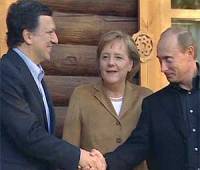EU leaders and Russia traded barbs over Russia's human rights record at the end of summit
The leaders of the European Union and Russia traded barbs over Russia's human rights record at the end of their summit.

German Chancellor Angela Merkel complained that opposition activists were being prevented from traveling to a planned protest in the Volga River city of Samara, near the site of the EU-Russia summit.
"I'm concerned about some people having problems in traveling here," Merkel told reporters. "I hope they will be given an opportunity to express their opinion."
Police prevented the former chess champion Garry Kasparov, now a leading political foe of President Vladimir Putin, and other opposition activists from boarding flights to Samara. They confiscated passports and tickets at Moscow's Sheremetyevo airport, and held them for about five hours. Activists in Samara also said they were harassed by authorities.
Merkel's remark came amid a sometimes fractious exchange between Putin and EU leaders at the news conference over Russia's democratic freedoms and the government's treatment of critics two of the most sensitive issues haunting Russia-EU relations.
Putin said his government does not fear protests, but insisted that opponents of the government must abide by the law and official regulations. He also blamed some violence on demonstrators.
"They don't bother me in any way," Putin said of the so-called "Dissenters' Marches" staged by Kasparov and other Kremlin critics, which have been brutally dispersed by police. "All those who want to stage demonstrations in accordance with the law have such an opportunity. But some provoke law enforcement forces to use force, and they respond accordingly."
The Dissenters' March set to take place in Samara was sanctioned by the local authorities, but police detained many of its organizers including their most visible leader, Kasparov in the run-up to the event.
Putin deflected allegations that the official crackdown on protests reflects the Kremlin's fear of letting the voices of its critics be heard. "There is no reason to fear marginal groups, especially so small," he said.
He also sought to turn the tables on his European guests, pointing at German police who have also detained protesters. "Law enforcement authorities in practically all countries make preventative arrests, there are examples in Germany," he said. "Such action isn't always justified."
Merkel responded that police action against participants in violent riots could be justified and added in a clear reference to Friday's move against Kasparov and others: "If a person hasn't done anything yet, if he's just on his way to a demonstration, that's a completely different case."
Putin also assailed the EU for failing to respond to the death of a Russian citizen during clashes between police and ethnic Russian protesters in Estonia over the removal of a monument to a Soviet soldier from Tallinn, the capital.
Tensions between Russia and Estonia, which were fueled by a pro-Kremlin, nationalist youth group blockading the Estonian Embassy in Moscow and chasing the Estonian ambassador, cast a cloud over the summit.
Estonian government Web sites have come under cyber-attack, which Estonian officials suggest came from Russia and had perhaps been coordinated by Moscow.
European Commission President Jose Manuel Barroso told reporters at Volzhsky Utyos, a riverside resort, that democracy and rule of law are "sacred principles for the EU."
"We stress the importance of democracy, freedom of the press, freedom of association, freedom of demonstration," he said. "These are values (which) I'm sure, unite, not divide us. It's very important for all European countries, and Russia is a European country ... to ensure the full respect of those principles and values."
As they argued over Russia's alleged rollback of democracy and the lack of progress on a dispute over a Russian ban on Polish meat and plant exports, Putin and the EU leaders pointed to progress in trade and economic ties and plans for future cooperation.
The two sides claimed they made progress on some relatively non-controversial issues, though no formal new agreements were reached. Putin said he and the EU leaders agreed to extend EU-Russia cooperation on cross-border trade, visa issues and scientific and technical cooperation.
Merkel added that the EU and Russia reached an understanding to resume discussion on a possibility of EU investments in Russia's strategic sectors.
Putin sought to present the Polish meat dispute as a bilateral problem that blocked the expansion of Russia-EU ties.
"We need each other, we are open for an honest dialogue between Russia and the EU," Putin said at one point. "But we must defend our interests in the same professional way as our partners do that."
Merkel and Barroso emphasized European solidarity.
"A Polish problem is a European problem," Barroso said, adding that the EU also fully backs its members Estonia and Lithuania in their disputes with Moscow.
More than 100 protesters gathered at a square in Samara in the late afternoon, outnumbered by police, and marched through the streets shouting slogans including "Russia without Putin!" and "We need another Russia."
Several protesters held black-yellow-and-white flags of Other Russia, an opposition movement that includes Kasparov's United Civil Front. A few held a banner reading "Russian without Putin and successors."
Subscribe to Pravda.Ru Telegram channel, Facebook, RSS!


